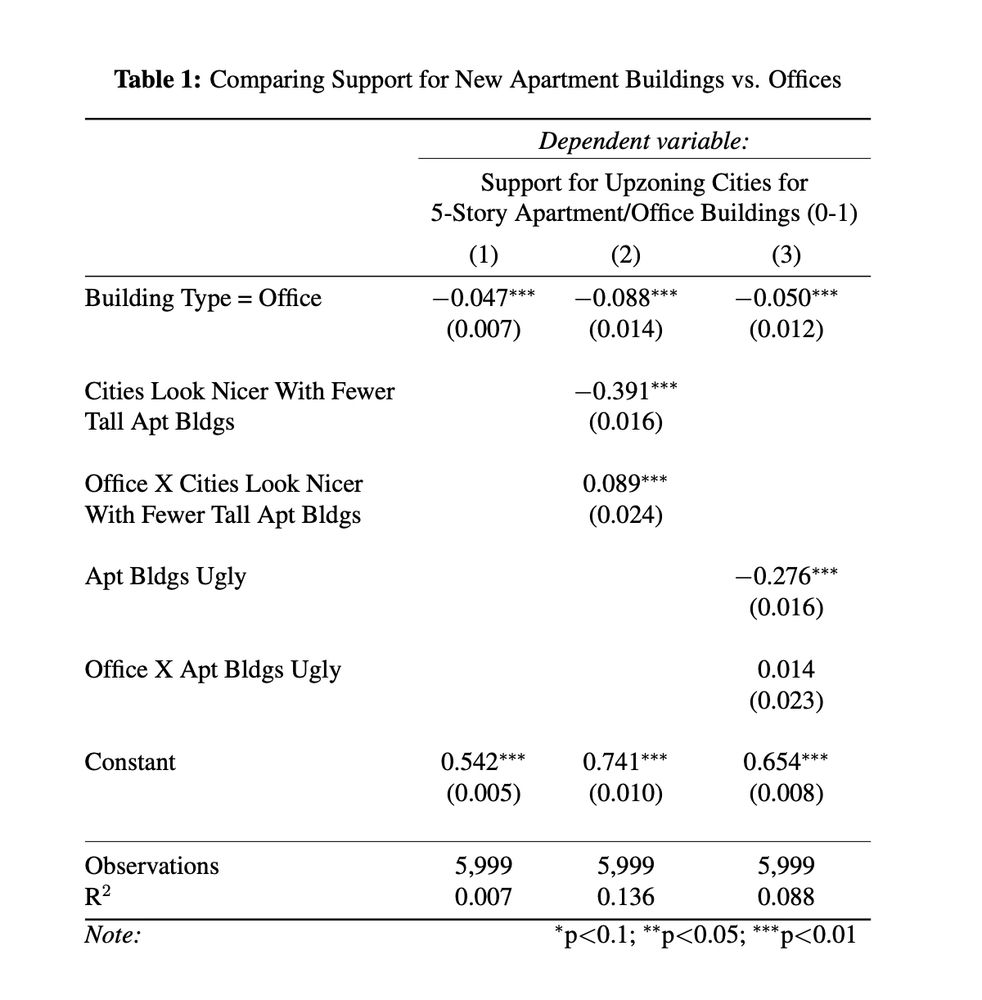
Writing your students grad school rec letters? Encourage them to also apply for our political science predoc position at UC Berkeley!
aprecruit.berkeley.edu/JPF05187
@dbroockman.bsky.social
Day job = Associate Prof. of Political Science at UC Berkeley. Tweets = personal views.

Writing your students grad school rec letters? Encourage them to also apply for our political science predoc position at UC Berkeley!
aprecruit.berkeley.edu/JPF05187

Today, social media platforms hold the sole power to study the effects of feed-ranking algorithms. We developed a platform-independent method that reranks participants’ feeds in real time and used this method to conduct a preregistered 10-day field experiment with 1256 participants on X during the 2024 US presidential campaign. Our experiment used a large language model to rerank posts that expressed antidemocratic attitudes and partisan animosity (AAPA). Decreasing or increasing AAPA exposure shifted out-party partisan animosity by more than 2 points on a 100-point feeling thermometer, with no detectable differences across party lines, providing causal evidence that exposure to AAPA content alters affective polarization. This work establishes a method to study feed algorithms without requiring platform cooperation, enabling independent evaluation of ranking interventions in naturalistic settings.
New paper in Science:
In a platform-independent field experiment, we show that reranking content expressing antidemocratic attitudes and partisan animosity in social media feeds alters affective polarization.
🧵

Writing your students grad school rec letters? Encourage them to also apply for our political science predoc position at UC Berkeley!
aprecruit.berkeley.edu/JPF05187

Still thinking about this article. It’s always been a sore spot in YIMBY circles that so many progressive foundations pour money into NIMBYism, and I’m glad it’s finally being aired in public. Keep talking about it. www.insidephilanthropy.com/home/philant...
27.11.2025 03:00 — 👍 426 🔁 72 💬 8 📌 7You can read the full paper here: osf.io/kz4m8
We look forward to hearing everyone's feedback!
We don't claim homeowner self-interest or NIMBYism don't matter.
But our findings suggest that "fear of an ugly America" is an underrated driver of the housing crisis and could contribute to what has been called NIMBYism. Addressing it could unlock new support for more housing.
Second, this explains why "missing middle" housing or upzoning commercial strips is often more politically feasible than general upzoning. It respects the voter's desire for visual congruence—putting taller buildings where they "look right."
25.11.2025 20:12 — 👍 5 🔁 0 💬 2 📌 1What are the potential policy implications?
First, design matters. If the YIMBY movement wants to build broad coalitions, it cannot ignore aesthetics. Policies that ensure better design or "fitting in" (like form-based codes) might reduce political friction.

To provide a different kind of causal leverage, we also tested this with video. Watching a short clip that framed modern "boxy" architecture as ugly reduced support for upzoning. Aesthetic complaints create opposition to supply-side reforms.
25.11.2025 20:12 — 👍 4 🔁 0 💬 2 📌 0These judgments are *sociotropic*. Voters didn't just oppose ugly buildings on their own block; they opposed policies that would allow "ugly" buildings anywhere. Just as people support redistribution for the "greater good" they support aesthetic regulation for the "greater good"
25.11.2025 20:12 — 👍 7 🔁 0 💬 1 📌 0
These are the building designs we used in the second experiment.
NB: I used to live in building (b), and it passed SF's design review. Voters hate it and don't want to approve housing like it! Maybe our design review processes should be better.

In a second vignette, we showed respondents images of buildings.
The results also confirm that both visual appeal and fit in context powerfully drive support for housing, and seemingly far more than affordability concerns.
The drop in support from the project being "on your block" is half the size of it being in a non-dense vs. already-dense area elsewhere
Perhaps part of why single family homeowners oppose local density isn't NIMBYism, but a widely shared view density should go in already-dense areas

We then ran an experiment varying attributes of a proposed building: taxes, parking, and the architect's design reputation.
Result 1: The aesthetic quality of the project was a massive driver of support--outweighing concerns about parking or tax revenue.
Result 2...

Is "aesthetics" just a pretext for excluding lower-income residents? We tested this by comparing support for apartments vs. similarly sized office buildings. If it was about residents, people should prefer offices. But they oppose offices even more. Physical structure matters.
25.11.2025 20:12 — 👍 12 🔁 1 💬 1 📌 1
How much does "ugliness" actually matter compared to other concerns? A lot.
We surveyed voters on various objections to housing. As Figure 3 shows, the belief that "Cities look nicer when they have fewer tall apartment buildings" is a top predictor of opposition.
This may explain the political success of "commercial corridor" upzoning policies (like CA's AB 2011). It's not just about avoiding NIMBY homeowners; it's that voters view density as aesthetically appropriate in already-dense areas, regardless of where they personally live.
25.11.2025 20:12 — 👍 6 🔁 0 💬 1 📌 1
We found widespread support for 5-story apartments along commercial corridors (where they fit), but sharp opposition in single-family neighborhoods (where they clash).
Even people who live in dense areas support density more where they live than elsewhere!
We think two things are going on here:
1. People self-select into neighborhoods that match their aesthetic tastes. If you live in density, you likely have a "taste" for it.
2. Voters prefer development that "fits in" with the existing built environment....

As motivation, look at this puzzle
Existing theories predict homeowners in dense areas should be the biggest opponents of more density in already-dense areas--it's their backyard!
But homeowners on corridors are actually *most* supportive of AB 2011-style upzoning of corridors!
We propose a third explanation: Sociotropic Aesthetic Judgments.
Voters form automatic judgments about whether a building is visually appealing or "fits in."
Importantly, they apply these aesthetic standards broadly—not just on their own block, but wherever housing is proposed.
These theories have clear merits, but also gaps:
Difference between homeowners & renters often aren't large.
& noting that NIMBYism is real leaves open the question of the content of NIMBY concerns and how they can be mitigated.
The US housing shortage is acute & driven by policy. The prevailing explanations for why voters oppose new supply focus on two things:
"Homevoters": Homeowners protecting property values.
"NIMBYism": Neighbors fearing local nuisances (traffic, parking) in their "backyard."

NEW PAPER w/ @cselmendorf.bsky.social & @jkalla.bsky.social:
An under-appreciated reason why voters oppose dense new housing, especially in less-dense neighborhoods: they think it looks ugly and want to prevent that, even in other neighborhoods.
Some of what we think is NIMBYism might not be!

The Berkeley Center for American Democracy is hiring a predoc next year to work with @gabelenz.bsky.social @hrendleman.bsky.social Cecilia Mo & me. Deadline Jan 30.
aprecruit.berkeley.edu/JPF05187

UC Berkeley is hiring an Assistant Professor this fall, with a preference for candidates in International Relations, American Politics, or Public Law.
I am on the committee and glad to answer questions. Please apply!
aprecruit.berkeley.edu/JPF04948

My Chinese school made a fun video about my Chinese learning journey. Don’t judge the pronunciation, it was filmed in 2023! 🙈
youtube.com/watch?v=Ay4D...
Trump administration: We’ll beat China by destroying everything that makes us competitive with China.
31.05.2025 16:53 — 👍 166 🔁 65 💬 6 📌 3That's what we mean by "brand"! :)
28.05.2025 04:36 — 👍 3 🔁 0 💬 0 📌 0Will add this to our list to look at! We do have candidate fixed effects so our main specification shouldn't contain any bias from that.
27.05.2025 22:32 — 👍 3 🔁 0 💬 0 📌 0